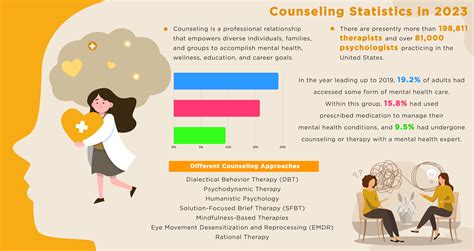Amidst the complexities and challenges of modern life, mental health issues have emerged as a prevalent concern affecting individuals from all walks of life. The stigma surrounding mental health has gradually diminished, leading to an increased awareness of the need for professional support. Counseling professionals play a crucial role in providing guidance and support to individuals navigating mental health challenges.

The Scope of Counseling Services
Counseling services encompass a wide range of issues, including:
- Mental health disorders: Anxiety, depression, bipolar disorder, schizophrenia, and other mental health conditions
- Emotional distress: Grief, loss, trauma, and stress
- Relationship difficulties: Interpersonal conflicts, family problems, and romantic struggles
- Career guidance: Career exploration, job search assistance, and career transitions
- Personal growth: Self-esteem, self-awareness, and finding meaning in life
The Importance of Counseling Professionals
Counseling professionals are trained to:
- Provide a safe and supportive environment: They create a confidential space where individuals can express their thoughts and feelings without judgment.
- Facilitate self-exploration and understanding: They assist individuals in identifying their thoughts, feelings, and behaviors to gain a deeper understanding of themselves.
- Develop coping mechanisms: They teach individuals practical strategies to manage stress, overcome challenges, and improve their well-being.
- Promote positive change: They help individuals set goals, overcome obstacles, and make lasting changes in their lives.
The Benefits of Counseling
Research has consistently shown that counseling can have numerous benefits, including:
- Reduced symptoms of mental health disorders: Counseling can effectively alleviate symptoms of anxiety, depression, and other mental health conditions.
- Improved quality of life: Counseling can enhance overall well-being, increase happiness, and improve relationships.
- Increased self-awareness and self-esteem: Counseling can foster self-reflection, leading to a better understanding and acceptance of oneself.
- Improved coping skills: Counseling can provide individuals with the tools to navigate difficult situations and manage stress effectively.
- Enhanced problem-solving ability: Counseling can help individuals develop problem-solving skills to address challenges in various aspects of their lives.
Choosing a Counseling Professional
Selecting the right counseling professional is crucial to finding effective support. Here are some factors to consider:
- Credentials: Ensure that the counselor has the appropriate education, training, and licensing to provide counseling services.
- Experience: Inquire about the counselor’s experience in treating clients with similar issues to yours.
- Approach: Different counselors have different approaches to counseling. Find a counselor whose approach resonates with you.
- Availability: Consider the counselor’s availability and whether their schedule aligns with your needs.
- Cost: Determine the cost of counseling and explore any insurance coverage you may have.
Innovative Applications of Counseling
In addition to traditional counseling settings, counselors are exploring innovative applications of their skills:
- Telehealth: Counseling via video conferencing or phone, making it accessible to individuals who may not be able to attend in-person sessions.
- Online counseling platforms: Websites and apps that provide access to online counseling services and resources.
- Group therapy: Counseling sessions involving multiple individuals with similar issues, fostering a sense of community and support.
- Workplace counseling: Programs offered by employers to provide counseling services to employees in the workplace.
- School counseling: Services provided within schools to support the mental health and well-being of students.
Conclusion
Counseling professionals play a vital role in addressing mental health challenges and promoting well-being. Their services empower individuals to navigate life’s complexities, overcome obstacles, and achieve a fulfilling life. By choosing the right counselor and engaging in the counseling process, individuals can unlock their potential, enhance their mental health, and live happier, more meaningful lives.
Table 1: Prevalence of Mental Health Disorders (National Survey on Drug Use and Health, 2020)
| Mental Health Disorder | Percentage of Adults with Past-Year Mental Illness |
|---|---|
| Anxiety disorder | 19.1% |
| Mood disorder, including depression | 16.5% |
| Substance use disorder | 14.5% |
| Serious mental illness (e.g., schizophrenia) | 4.2% |
| Any mental illness | 47.6% |
Table 2: Benefits of Counseling (American Psychological Association, 2022)
| Benefit | Percentage of Individuals Reporting |
|---|---|
| Reduced symptoms of mental health disorders | 75% |
| Improved quality of life | 85% |
| Increased self-awareness and self-esteem | 90% |
| Improved coping skills | 70% |
| Enhanced problem-solving ability | 65% |
Table 3: Characteristics of Effective Counselors (American Counseling Association, 2021)
| Characteristic | Description |
|---|---|
| Empathy: The ability to understand and share the feelings of others | |
| Active listening: The ability to pay attention to and comprehend what others are saying | |
| Ethical: Adhering to professional codes of conduct and ethical guidelines | |
| Cultural sensitivity: The ability to understand and respect different cultures | |
| Effective communication: The ability to communicate clearly and effectively with clients |
Table 4: Innovative Applications of Counseling
| Application | Description |
|---|---|
| Telehealth | Counseling provided remotely via video conferencing or phone |
| Online counseling platforms | Websites and apps offering access to online counseling services |
| Group therapy | Counseling sessions involving multiple individuals with similar issues |
| Workplace counseling | Counseling services offered by employers to employees in the workplace |
| School counseling | Services provided within schools to support the mental health of students |
